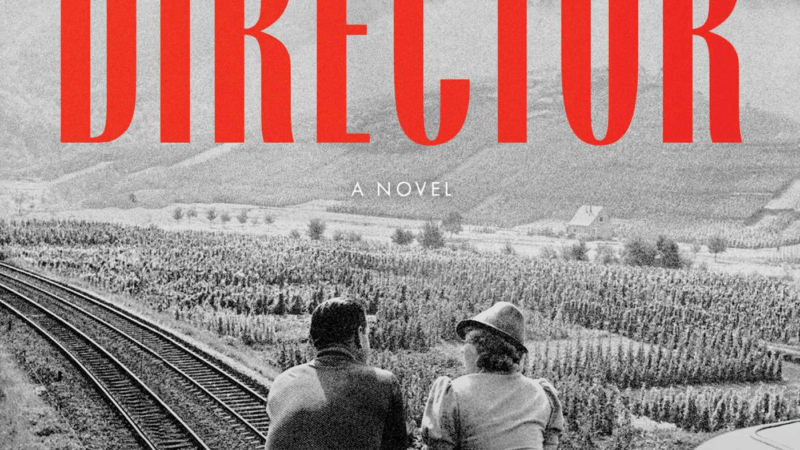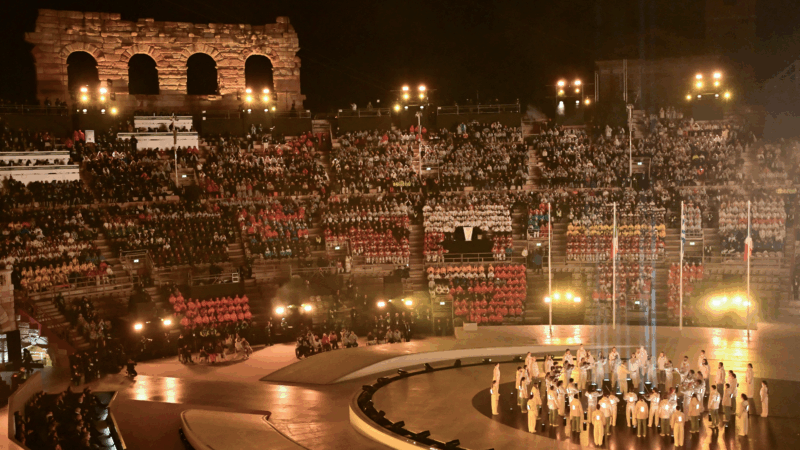A filmmaker in Nazi Germany strikes a deal with the devil in ‘The Director’
In the German legend, Faust signs a contract with the devil, exchanging his immortal soul for vast knowledge and other earthly rewards. It’s a cut-and-dried transaction.
In Daniel Kehlmann’s new novel, The Director, the demonic deal-making is murkier, more drawn out. Little by little, a series of compromises eat away like acid at the integrity of a once-great artist. Not only is Kehlmann’s rendering of the Faustian bargain more psychologically plausible than the original, but it takes its inspiration from a true-life story.
The Director is an historical novel based on the life of G.W. Pabst, the early film director who worked with actresses like Louise Brooks, Lotte Lenya and Greta Garbo. Pabst’s career moves were circuitous and puzzling — which makes him a tasty subject for historical fiction. He was born in Austria and worked in theater in New York as a young man; then, after World War I, he became one of the most influential directors in Germany.
Pabst headed to Hollywood in the 1930s and was a temporary and less successful member of that émigré colony of filmmakers that included Otto Preminger and Fritz Lang. On a trip to France in 1939 to make a film and visit his mother, Pabst was stranded by the outbreak of war and returned to Nazi Germany. Enter the devil in the form of propaganda minister Joseph Goebbels.
In Kehlmann’s reimagining, Goebbels cunningly wields a stick and a carrot: He alternates the accusation that Pabst was a Communist who belongs in a concentration camp with appeals to Pabst’s ego, bruised by Hollywood’s treatment of him as a highbrow hack. In Germany, Goebbels’ promises, Pabst will make: “Artistic films. Sublime films. Films that touch the German hearts of good, deep, metaphysical people. … To oppose the American cheap commercial trash with a resounding no.”
It’s an offer Pabst feels he can’t refuse.
As a novel, The Director itself joins the pleasures of “commercial” fiction with the moral weight of a novel of ideas. Kehlmann clearly has fun vividly invoking a sun-splashed Hollywood party where Billy Wilder cavorts in a cowboy hat and studio execs casually confuse the émigré filmmakers with one another.
But comedy turns sinister and surreal in later sections where Pabst and his family return to their castle in Germany where the caretaker — now the local Nazi party leader — relegates them to the basement. And then there’s the absurdist scene where Pabst directs close Hitler confidante Leni Riefenstahl in an imagined film. As the extras — shipped in from a nearby detention camp — look on, Riefenstahl insists that Pabst retake the scene some 21 times. Each time Riefenstahl is terrible, but, Pabst quickly catches on that it’s dangerous to tell her anything but, it’s “Perfect. … Just perfect again.”
Perhaps Kehlmann’s greatest accomplishment is that he manages to raise the larger themes through compact dialogues. Here, for instance, is a conversation about art and morality that he conjures up between Pabst and his wife Trude, who was an actress and writer:
“[A]ll this will pass [Pabst tells Trude]. But art remains.
“Even if it remains [Trude asks] the … art. Doesn’t it remain soiled? Doesn’t it remain bloody and dirty? …”
Pabst responds this way: “And the Renaissance? What about the Borgias and their poisonings, what about Shakespeare, who had to make accommodations with Elizabeth.” Later he adds: “The important thing is to make art under the circumstances one finds oneself in …” Referencing his film Paracelsus, Pabst says, “Paracelsus will still be watched fifty years from now, when this nightmare is long forgotten.”
When do compromises turn into full-blown capitulation? How many accommodations can someone make with evil before they themselves become part of the evil? Do we forget nightmares or is history just the reliving of them over and over again? The Director doesn’t answer these questions, cannot answer them; but it leaves them rattling around in our minds like a roulette machine that never stops spinning.
Transcript:
TONYA MOSLEY, HOST:
This is FRESH AIR. German-born writer Daniel Kehlmann was shortlisted for the International Booker Prize in 2020 for his novel “Tyll.” His latest novel, “The Director,” is largely set in Nazi Germany and raises questions about art and collaboration. Our book critic, Maureen Corrigan, has a review.
MAUREEN CORRIGAN, BYLINE: In the German legend, Faust signs a contract with the devil, exchanging his immortal soul for vast knowledge and other earthly rewards. It’s a cut-and-dried transaction. In Daniel Kehlmann’s new novel, “The Director,” the demonic dealmaking is murkier, more drawn out. Little by little, a series of compromises eat away like acid at the integrity of a once great artist. Not only is Kehlmann’s rendering of the Faustian bargain more psychologically plausible than the original, but it takes its inspiration from a true-life story.
“The Director” is an historical novel based on the life of G.W. Pabst, the early film director who worked with actresses like Louise Brooks, Lottie Lenya and Greta Garbo. Pabst’s career moves were circuitous and puzzling, which makes him a tasty subject for historical fiction. He was born in Austria and worked in theater in New York as a young man. Then, after World War I, he became one of the most influential directors in Germany. Pabst moved to Hollywood in the 1930s and was a temporary and less successful member of that emigre colony of filmmakers that included Otto Preminger and Fritz Lang. On a trip to France in 1939 to make a film and visit his mother, Pabst was stranded by the outbreak of war and returned to Nazi Germany. Enter the devil in the form of propaganda minister Joseph Goebbels.
In Kehlmann’s reimagining, Goebbels cunningly wields a stick and a carrot. He alternates the accusation that Pabst was a Communist who belongs in a concentration camp with appeals to Pabst’s ego, bruised by Hollywood’s treatment of him as a highbrow hack. In Germany, Goebbels promises, Pabst will make artistic films, sublime films, films that touch the German hearts of good, deep, metaphysical people to oppose the American cheap commercial trash with a resounding no. It’s an offer Pabst feels he can’t refuse.
As a novel, “The Director” itself joins the pleasures of commercial fiction with the moral weight of a novel of ideas. Kehlmann clearly has fun vividly invoking a sun-splashed Hollywood party, where Billy Wilder cavorts in a cowboy hat and studio execs casually confuse the emigre filmmakers with one another. But comedy turns sinister and surreal in later sections where Pabst and his family return to their castle in Germany, where the caretaker – now the local Nazi Party leader – relegates them to the basement.
And then there’s the absurdist scene where Pabst directs close Hitler confidante Leni Riefenstahl in an imagined film. As the extras shipped in from a nearby detention camp look on, Riefenstahl insists that Pabst retake the scene some 21 times. Each time Riefenstahl’s performance is terrible, but Pabst quickly catches on that it’s dangerous to tell her anything but, it’s perfect, just perfect again.
Perhaps Kehlmann’s greatest accomplishment is that he manages to raise larger themes through compact dialogues. Here, for instance, is a conversation about art and morality that he conjures up between Pabst and his wife Trude, who was an actress and writer. All this will pass, Pabst tells Trude, but art remains. Even if it remains, Trude asks, the art – doesn’t it remain soiled? Doesn’t it remain bloody and dirty? Pabst responds this way – and the Renaissance? What about the Borgias and their poisonings? What about Shakespeare, who had to make accommodations with Elizabeth? He adds, the important thing is to make art under the circumstances one finds oneself in. Referencing his film “Paracelsus,” Pabst says, “Paracelsus” will still be watched 50 years from now when this nightmare is long forgotten.
When do compromises turn into full-blown capitulation? How many accommodations can someone make with evil before they themselves become part of the evil? Do we forget nightmares, or is history just the reliving of them over and over again? “The Director” doesn’t answer these questions, cannot answer them. But it leaves them rattling around in our minds like a roulette wheel that never stops spinning.
MOSLEY: Maureen Corrigan is a professor of literature at Georgetown University. She reviewed “The Director” by Daniel Kehlmann. On tomorrow’s show, R. Crumb, the king of underground comics, a famous eccentric and a musician caught up in the blues and jazz of the past. Crumb created Zap Comix and characters like Mr. Natural and Fritz the Cat. He’s the subject of a new biography. I hope you can join us.
FRESH AIR’s executive producer is Danny Miller. Our technical director and engineer is Audrey Bentham. Our managing producer is Sam Briger. Our interviews and reviews are produced and edited by Phyllis Myers, Roberta Shorrock, Ann Marie Baldonado, Lauren Krenzel, Therese Madden, Monique Nazareth, Susan Nyakundi, Anna Bauman and Joel Wolfram. Our digital media producer is Molly Seavy-Nesper. Thea Chaloner directed today’s show. With Terry Gross, I’m Tonya Mosley.
(SOUNDBITE OF JON-ERIK KELLSO’S “WAY WAY BACK”)
Reporters’ notebook: The Olympics closing ceremony is way more fun than you’d think
Olympics opening ceremonies tend to get more love than their closing counterparts. But a pair of NPR reporters who watched both in Italy left with a newfound appreciation for the latter.
Northeast readies for a major winter storm, with blizzard warnings in effect
New Jersey through Massachusetts could see 2 feet of snow. New York City's mayor said the city had not "seen a storm like this in a decade."
Mexican army kills leader of Jalisco New Generation Cartel, official says
The Mexican army killed the leader of the powerful Jalisco New Generation Cartel, Nemesio Rubén Oseguera Cervantes, "El Mencho," in an operation Sunday, a federal official said.
Ukraine’s combat amputees cling to hope as a weapon of war
Along with a growing number of war-wounded amputees, Mykhailo Varvarych and Iryna Botvynska are navigating an altered destiny after Varvarych lost both his legs during the Russian invasion.
University students hold new protests in Iran around memorials for those killed
Iran's state news agency said students protested at five universities in the capital, Tehran, and one in the city of Mashhad on Sunday.
Pakistan claims to have killed at least 70 militants in strikes along Afghan border
Pakistan's military killed at least 70 militants in strikes along the border with Afghanistan early Sunday, the deputy interior minister said.







